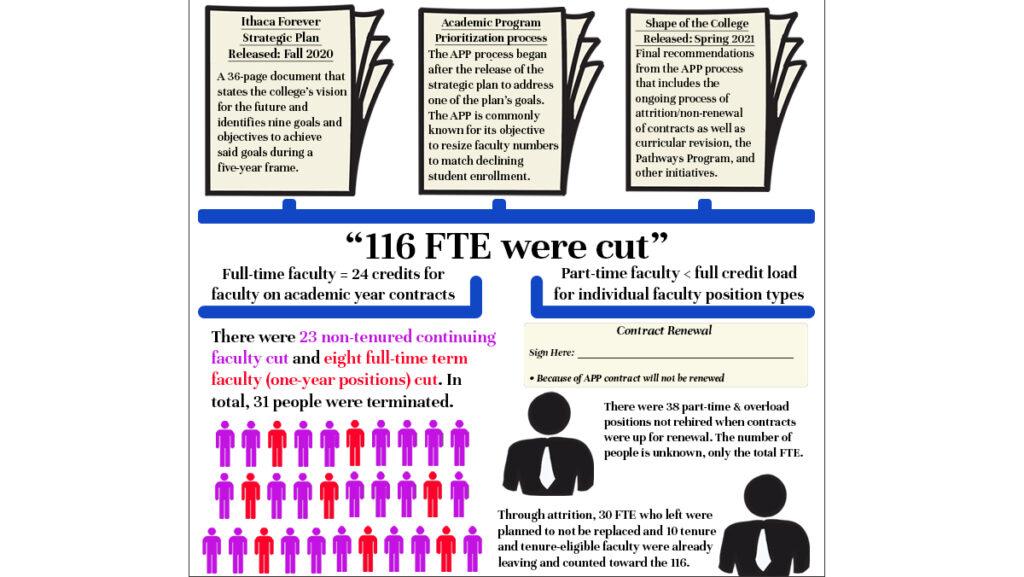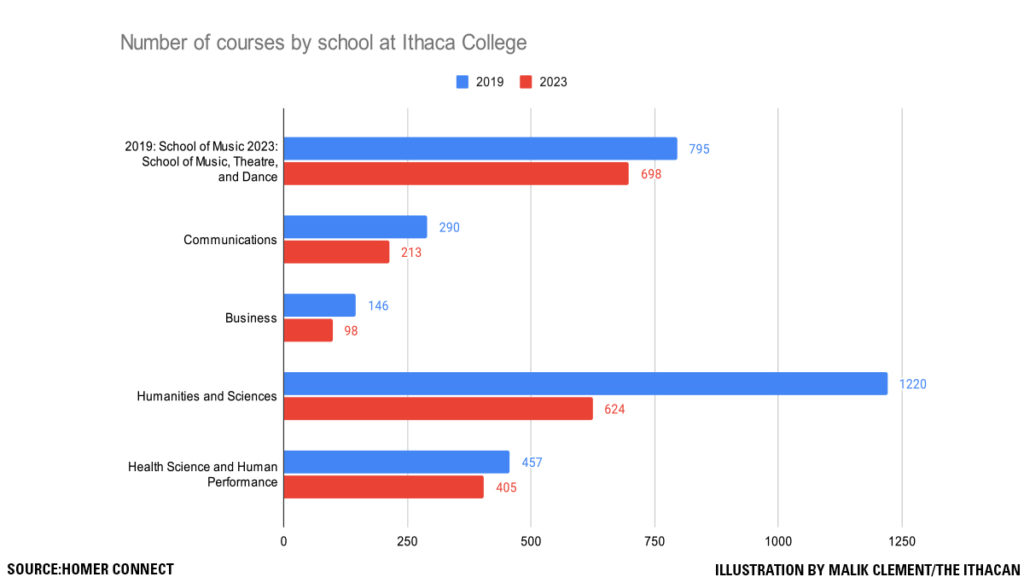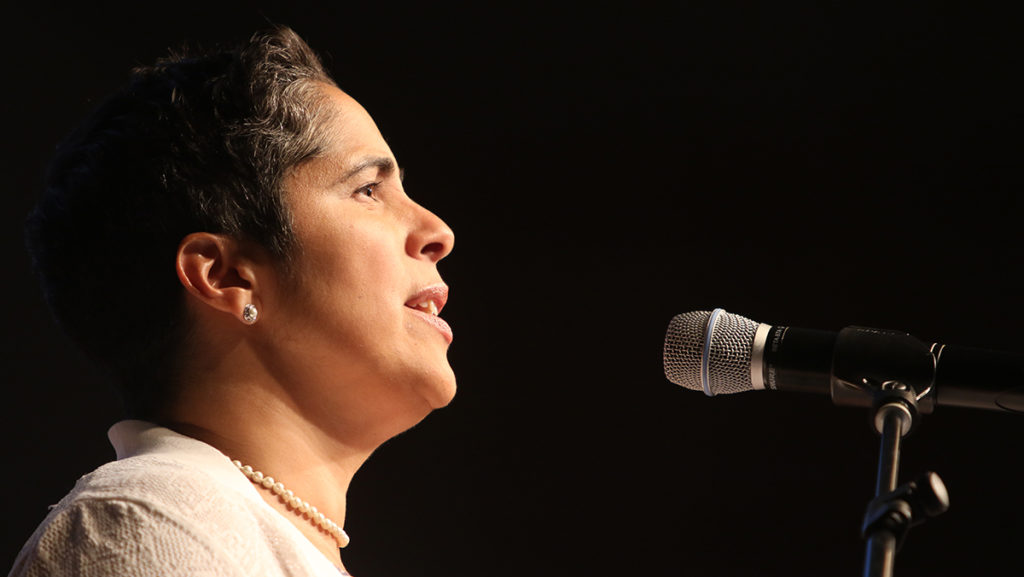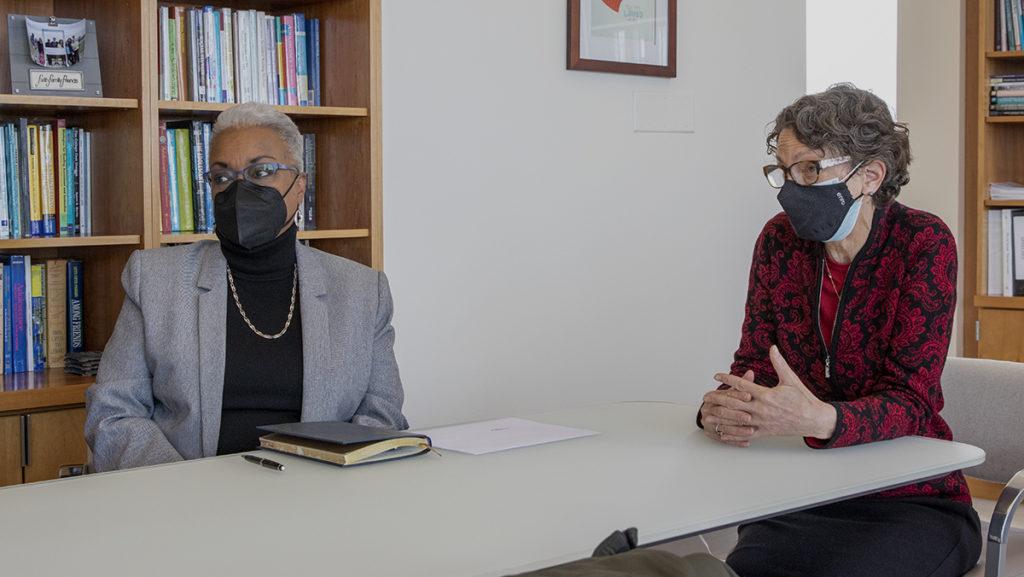The newly formed Ithaca College chapter of the American Association of University Professors (AAUP) is circulating a petition calling for the Senior Leadership Team (SLT) and the Ithaca College Board of Trustees to reject the draft plan for faculty, department, program and major cuts.
In January, a group of faculty members began working together to form an AAUP chapter at the college in response to the impending cuts. The AAUP works to advance academic freedom and shared governance in higher education. The petition asks for increased shared governance, an extended timeline and increased financial transparency throughout the Academic Program Prioritization (APP) process. The college is planning to eliminate 116 full-time equivalent (FTE) faculty positions and 26 departments, majors and programs. As of Feb. 17, there are 208 signatures on the petition.
Dan Breen, associate professor in the Department of English and chair of the IC AAUP, said the petition was the best method for the chapter to communicate its concerns to the college.
“The three requests the petition makes reiterate questions and concerns that have appeared elsewhere, but we wanted to present these requests as clearly as possible and tie them clearly to AAUP principles,” Breen said via email.
After the rejection of the recommendations for the cuts, the petition calls for the Academic Program Prioritization Implementation Committee (APPIC) to be restructured to include tenured, non-tenure eligible and contingent faculty members. There are no faculty members on the APPIC.
“While it is certainly the case that Ithaca College faculty were able to contribute feedback to the APPIC as it was in the process of composing its recommendations and after seeing the draft recommendations first circulated on Jan. 13, this does not in itself constitute shared governance,” the IC AAUP stated in the petition.
In its report titled “The Role of the Faculty in Budgetary and Salary Matters,” the AAUP states that faculty members should be involved in the development of the institutional budget and in relevant financial decisions about salaries, academic programs, tuition and others.
“No faculty members were appointed or elected to APPIC, and therefore the faculty have not fully participated in the process of decision-making or implementation,” the IC AAUP said in the petition.
The petition asks for the timeline of the APP process to be drawn out, for more faculty members to be on campus to participate in the process and for those whose positions are recommended for termination to be allowed to retain their jobs throughout the COVID-19 pandemic. Some faculty members have not returned to campus and are teaching their classes remotely because of the COVID-19 pandemic.
The Faculty Council has previously requested that the APP process be delayed, but the administration denied this request.
The petition also calls for the college to release a document that presents the college’s financials. This would include audited financial statements; breakdowns by department; projected revenues and expenses, including administrative salaries and new hires within the administration; the performance of the endowment; a summary of the total liquid assets; and a justification of why the college needs to decrease enrollment to 5,000 students.
In its report “Recommended Institutional Regulations on Academic Freedom and Tenure,” the AAUP states that an elected faculty governance body should participate in discussions surrounding financial exigency — an imminent financial crisis which threatens the survival of the institution as a whole — including spending of one-time money or reserves, furloughs, pay cuts, delayed compensation plans, early retirement packages and cuts to noneducational programs and services, including expenses for administration.
“Yet the college community has been told repeatedly that we are not presently in a condition of financial exigency,” the IC AAUP stated in the petition. “Certainly, no faculty-elected or faculty-appointed body has participated in a determination of financial exigency. In addition, the campus community has not been informed of any specific alternative proposals or possibilities that may have been considered, nor have faculty participated in the identification of criteria for the elimination of positions.”
The IC AAUP also expressed concerns about the effects of the recommendations on academic freedom.
“Departments and programs will be forced to change their curricula in response to the recommendations because present curricula cannot be staffed at such dramatically reduced levels,” the IC AAUP stated in the petition.
The results of a vote conducted by the Faculty Council showed that many other faculty members share these concerns.
“The petition has signatures from various constituencies — IC students, alums, former faculty members, faculty members at other institutions and community supporters — but the goal was to present it primarily to IC faculty,” Breen said via email. “We are impressed by and grateful for the response, and expect to submit the petition very soon.”














